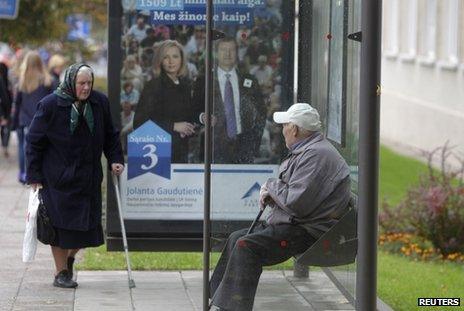Lithuania election: Voters 'dump austerity government'
- Published

Lithuanians have voted out their conservative government after one of the world's deepest recessions, incomplete results suggest.
Two leftist parties, Labour and the Social Democrats, appear to have finished first and second, and their leaders have met to discuss coalition.
Correspondents said PM Andrius Kubilius' government had been punished for cutting pensions and public wages.
Separately, Lithuanians voted against plans for a new nuclear power station.
The government said the plant would cut dependence on imported Russian energy.
But other parties questioned its affordability. The result from Sunday's referendum is non-binding, but leaves a big question mark over the future of the proposed plant.
Austerity unpopular
In the general election, with counting complete in three-quarters of voting districts, the Labour party had 21%, with the Social Democrats on 19%.
Prime Minister Kubilius' Homeland Union had 13%.
Even before complete results were in, the leaders of Labour, the Social Democrats and the lower-placed Order and Justice met in a Vilnius hotel.
"We're creating a working group to start consultations on a coalition," Labour leader Viktor Uspaskich said.
However, only half of MPs are chosen from national party lists. The other half come from local constituencies.
The final shape of the next government may depend on a second round of local voting, which takes place in two weeks' time.
The parties have promised to soften the government's austerity programme - though analysts say they will have limited room for manoeuvre.
Rebound too late
Mr Kubilius came to power in 2008, just as the global financial crisis was bringing a dramatic end to an extended Lithuanian boom fuelled by cheap Scandinavian credit.
Mr Kubilius enforced a drastic austerity programme, to stave off national bankruptcy.
Meanwhile, economic output dropped by 15%, unemployment climbed and thousands of young people emigrated from the Baltic nation of 3.3 million in search of work.
The budget deficit has since been tamed and GDP reached growth of 5.8%.
Lithuania's approach won praise from other governments and the International Monetary Fund, but analysts say the rebound came too late to translate into a political revival for the conservatives.
Social Democrat leader Algirdas Butkevicius has promised to raise the minimum wage, make the rich pay more tax and put back euro entry until 2015, a year later than scheduled.
Delaying euro entry means the country could run a bigger deficit than euro accession rules permit.
The parties of the left have also promised to improve the ex-Soviet state's strained relations with Russia, still Lithuania's biggest trade partner.
- Published22 August 2023
- Published3 October 2012